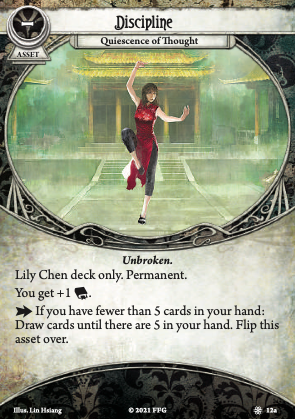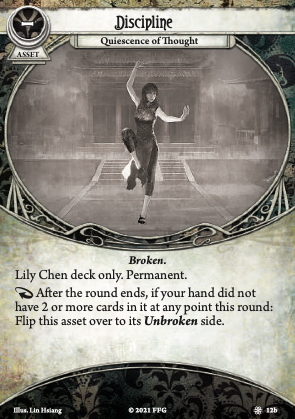Probably the least popular first pick Discipline, but I’ve found in the context of solo/2p, to be the best choice to build your starter deck around. The reasons are laid out below.
Firstly, in solo/2p, versatility is greater valued as a deckbuilding goal, and I argue should even be slightly biased towards clue discovery, no matter your chosen character. 3 Intellect is the reasonable spot where you can start investigating right off the bat (assuming Standard, Hard/Expert solo/2p needs different deckbuilding considerations), especially in earlier campaign scenarios where the shroud values at or around your starting location tend to be 2-3.
Compared against a +Willpower Lily build who needs to hard mull or draw/Arcane Initiate into either of her 2x Sixth Sense, a +Intellect Lily can more reliably start pulling clues early, especially with some support from a good range of cards such as Flashlights or pitched icons.
Secondly, this Discipline’s draw power has the highest potential in terms of game impact. In solo/2p, you can’t rely on other investigators to cover for you while you draw into your dream min-maxed combo. Quite often you got to deal with whatever the obstacle is yourself, which can range from show-stopping Arkham nonsense such as a Locked Door, to a stubborn enemy that just spawned on you while you aren’t “ready”.
The +WIP Discipline healing ability is a nice to have ability, but its scope to bail you out of a bad situation is extremely narrow. The +AGI combo ability is cool to pull off, but honestly if you already have the setup to have a reasonable shot at 3 different Fight/Evades, it’s more of an icing-on-the-cake-cool-to-have but not absolutely game saving ability, and is only limited to getting you out of bad situations involving enemies. The +STR Discipline’s AOOless +5 is pretty flexible, but I would argue the ability to draw into potential high-impact out options such as a Promise of Power or Spectral Razor in an emergency, has better value in solo/2p. Even better, this Discipline’s ability gets stronger the more desperately you need it, when you have lesser cards/options in hand, and just need something to quickly stabilise yourself.
Lastly, you probably won’t use the ability more than a couple of times each scenario, but if you do, it’s when you are desperate. Don’t be greedy and wait for when you have no or 1 card in hand, pulling for 3 cards or more in 1 action is already pretty good especially in a Guardian/Mystic.
All in all, do consider this as your first Discipline the next time you build for solo/2p Lily, and try a deck that is built around the ability to replenish cards the quicker you use them. Skill cards, fast abilities, cards with a versatile spread of icons, gain value in such a deck approach. Which, I would argue, dovetails nicely into the deckbuilding considerations for lower player counts.
(Review edited to remove a mistaken non-critical point I made about the Discipline potentially unbreaking itself the same turn you break it)

